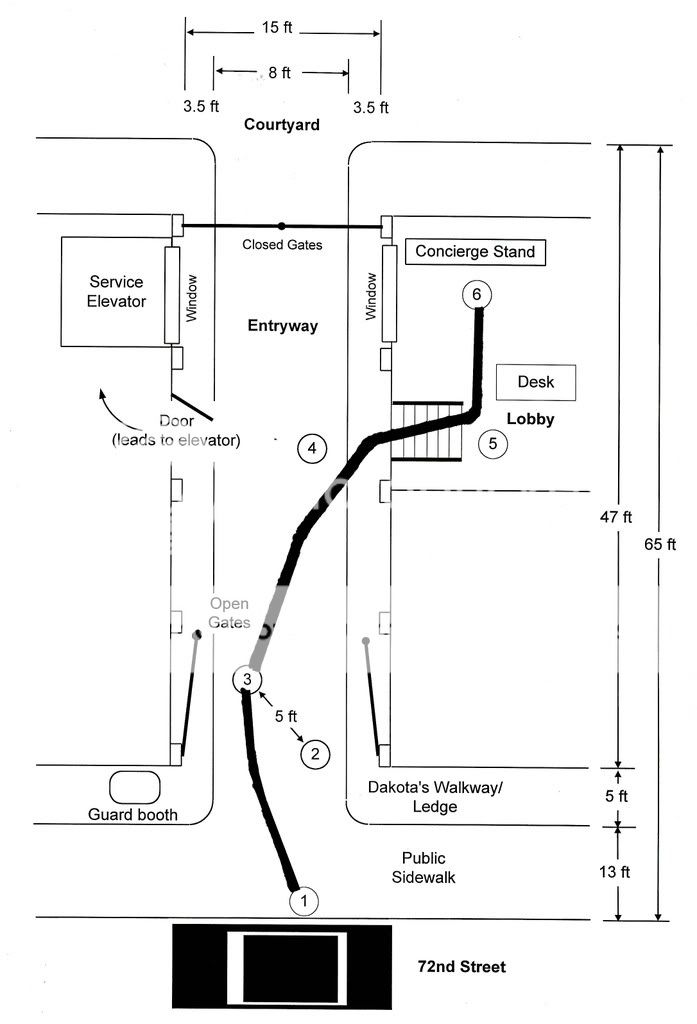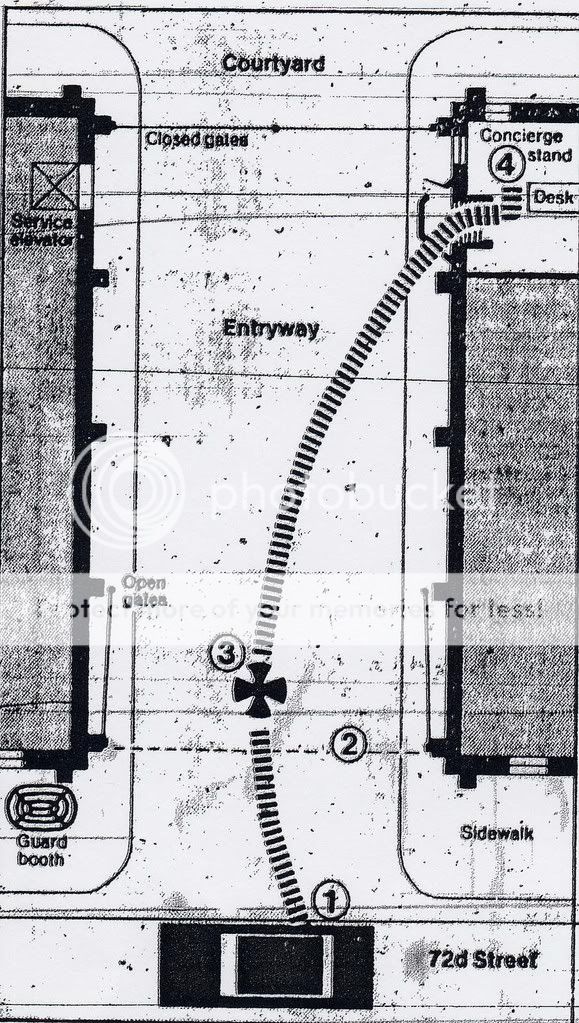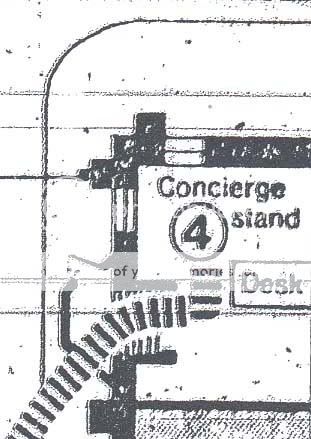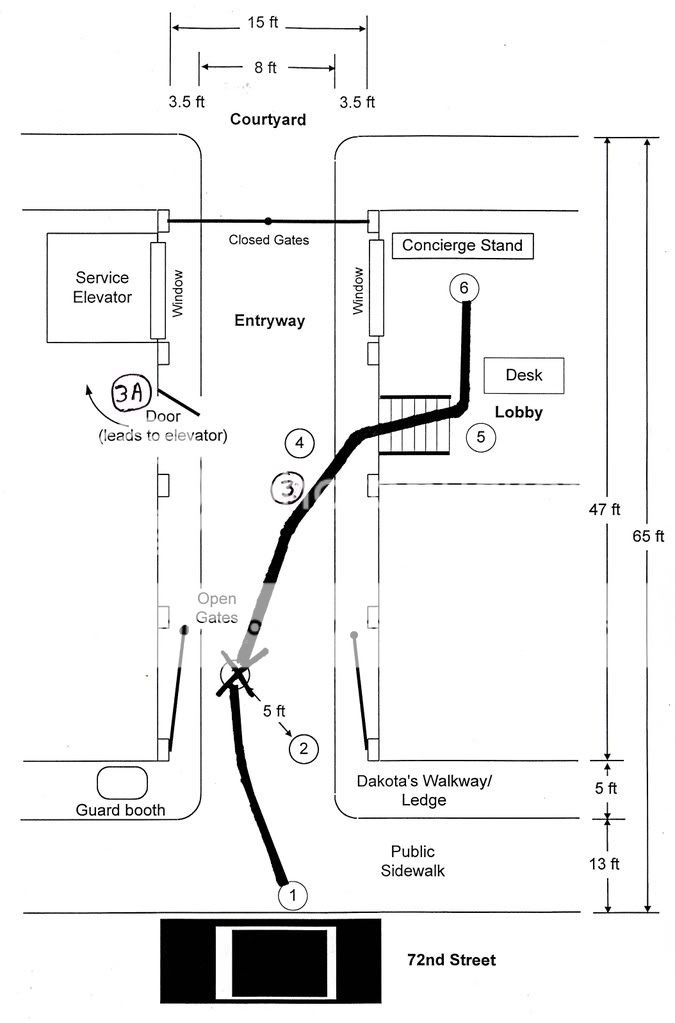It looks like you're using an Ad Blocker.
Please white-list or disable AboveTopSecret.com in your ad-blocking tool.
Thank you.
Some features of ATS will be disabled while you continue to use an ad-blocker.
share:
All I have to say is anyone who is not at least a little skeptical about it ought to do a little research on "Catcher in the Rye" and compile a
timeline of the odd places its shown up and the interesting people who had it in their posession at odd times...
Originally posted by wolfpawz
I don't understand why the CIA would want Lennon dead. I read that link, so what, he started a protest. He's a singer, what can he really do to become a threat to the government? We are just as much of a "threat" as he is by speaking as we are against the government.
Not true at all. Someone speaking out is dangerous. Someone who is insanely famous/popular speaking out is an imminent threat. History has proven, you take out a symbol or a central figure, you take out the group.
I think your post is very interesting.
I'm not sure if I agree with the theory that you pose, but I think that it wouldn't hurt if you looked into it further (unless you start being trailed. Then STOP. Immediately. lol)
Is it possible that he knew too much private info? Is it possible that he was a rogue Tavistock agent?
This is sort of off-topic, but one thing I've heard is that John Lennon didn't even like Paul McCartney. They especially detested each other during the latter Beatle-years.
I'm not sure if I agree with the theory that you pose, but I think that it wouldn't hurt if you looked into it further (unless you start being trailed. Then STOP. Immediately. lol)
Is it possible that he knew too much private info? Is it possible that he was a rogue Tavistock agent?
This is sort of off-topic, but one thing I've heard is that John Lennon didn't even like Paul McCartney. They especially detested each other during the latter Beatle-years.
Interesting. I wonder if they are responsible for killing some of the other greats. Even today. People always seem to die from "heart attacks" or
"over-dosing".
Any one mention the UFO that Lennon saw.
As I recall it was a small orb or saucer.
Guess everyone thinks he is so wigged out on drugs it was
just another '___' episode.
Jimi Hendrix had a UFO fascination and both knew one another.
I can't say what the UFO coverage was back then but UFO bashing
is so prevalent now those two back then might be a security risk
if their interest was viewed as a threat.
As I recall it was a small orb or saucer.
Guess everyone thinks he is so wigged out on drugs it was
just another '___' episode.
Jimi Hendrix had a UFO fascination and both knew one another.
I can't say what the UFO coverage was back then but UFO bashing
is so prevalent now those two back then might be a security risk
if their interest was viewed as a threat.
reply to post by Maya432
I support what you wrote 100%. I believe now that John Lennon was killed because he was a threat to the NWO. People who speak of peace and freedom are not part of the NWO plans, therefore, they are terminated and often in a way that it will not be questioned. There is a man by the name of Dave McGowan who put up a website on Laurel Canyon. This is a site that talks about all the mysterious murders of rock stars, etc., that have taken place since the 60s. It is Center for an Informed America at davesweb.cnchost.com...
I support what you wrote 100%. I believe now that John Lennon was killed because he was a threat to the NWO. People who speak of peace and freedom are not part of the NWO plans, therefore, they are terminated and often in a way that it will not be questioned. There is a man by the name of Dave McGowan who put up a website on Laurel Canyon. This is a site that talks about all the mysterious murders of rock stars, etc., that have taken place since the 60s. It is Center for an Informed America at davesweb.cnchost.com...
I'm not saying I believe or disbelieve this conspiracy hypothesis.
I do however think it bears pointing out that the CIA did (and this is well documented) conduct extensive tests involving hypnosis, and the use of hypnotics, anticonvulsives, hallucinogens, and other substances both natural and synthetic, in an effort to do exactly this; to, as stated in one of their memos, "get control of an individual to the point where he will do our bidding against his will and even against fundamental laws of nature such as self preservation."
These substances were in many instances (and this is documented in congressional record, as once congress got wind of these programs there was a bit of hell to pay) administered to individuals without their knowledge or consent i.e. unwittingly. These substances are capable of including highly suggestible states of consciousness; possibly well beyond the point of someone being capable of exerting their will or rational thought.
Torture was used in some instances.
Psychological disassociation during extreme trauma (resulting in dissociative personality disorder,) combined with such suggestible states and hypnosis, is the hypothesized means by which they are suspected of having been able to "program" people. That’s speculation, though. That this was their intent, however, is a matter of public record.
Did they succeed? That we don't know for certain. Many of the MKULTRA and related documents were destroyed in a fire before they could be presented to congress. It is possible - arguably probable - that they did not succeed.
However, it is most certainly also possible that they did. There is real evidence to support at least the possibility.
Personally, I have no opinion one way or the other. I'm an open-minded skeptic. I'm just pointing out the possibilities, and raising the point that this isn't just a case of not being able to prove a negative, but rather one of those rare instances where tangible evidence in support of a possibility actually exists. Evidence isn't proof, though, and I don't lean one way or the other.
I do however think it bears pointing out that the CIA did (and this is well documented) conduct extensive tests involving hypnosis, and the use of hypnotics, anticonvulsives, hallucinogens, and other substances both natural and synthetic, in an effort to do exactly this; to, as stated in one of their memos, "get control of an individual to the point where he will do our bidding against his will and even against fundamental laws of nature such as self preservation."
These substances were in many instances (and this is documented in congressional record, as once congress got wind of these programs there was a bit of hell to pay) administered to individuals without their knowledge or consent i.e. unwittingly. These substances are capable of including highly suggestible states of consciousness; possibly well beyond the point of someone being capable of exerting their will or rational thought.
Torture was used in some instances.
Psychological disassociation during extreme trauma (resulting in dissociative personality disorder,) combined with such suggestible states and hypnosis, is the hypothesized means by which they are suspected of having been able to "program" people. That’s speculation, though. That this was their intent, however, is a matter of public record.
Did they succeed? That we don't know for certain. Many of the MKULTRA and related documents were destroyed in a fire before they could be presented to congress. It is possible - arguably probable - that they did not succeed.
However, it is most certainly also possible that they did. There is real evidence to support at least the possibility.
Personally, I have no opinion one way or the other. I'm an open-minded skeptic. I'm just pointing out the possibilities, and raising the point that this isn't just a case of not being able to prove a negative, but rather one of those rare instances where tangible evidence in support of a possibility actually exists. Evidence isn't proof, though, and I don't lean one way or the other.
Geeze what was so special about him,just another musician,and if you ever listen to his album with Yoko Ono,you too would want to kill him lol
Originally posted by TeslaandLyne
Any one mention the UFO that Lennon saw.
As I recall it was a small orb or saucer.
Guess everyone thinks he is so wigged out on drugs it was
just another '___' episode.
Jimi Hendrix had a UFO fascination and both knew one another.
I can't say what the UFO coverage was back then but UFO bashing
is so prevalent now those two back then might be a security risk
if their interest was viewed as a threat.
Well at that period in time Lennon was supposedly of the drugs, so the UFO connection is very interesting.
I haven't posted in this topic before but i'm just now starting to seriously look into the assassination of Lennon and i'm trying to get as many views that i can.
I'm old enough (60) to know that John Lennon was a major headache to the authorities. I lived through the whole Beatle era.
Mark Twain once wrote words to the effect that Americans are a people endowed with a constitutional right to freedom of speech and with the common sense not to use it. John Lennon wasn't like Americans in that respect. He wasn't shy about being a human being with all that it implies and wasn't shy about saying what he thought.
His popularity and his ability to generate movement among the masses made him a serious navigational hazard for the powers that be.
Here is something strange that happened at the Chapman trial:
www.john-lennon.com...
After checking out some of the OP's links I am convinced that there is something to the notion that Mark David Chapman may have been a victim of MKUltra style conditioning.
[edit on 19-1-2009 by ipsedixit]
Mark Twain once wrote words to the effect that Americans are a people endowed with a constitutional right to freedom of speech and with the common sense not to use it. John Lennon wasn't like Americans in that respect. He wasn't shy about being a human being with all that it implies and wasn't shy about saying what he thought.
His popularity and his ability to generate movement among the masses made him a serious navigational hazard for the powers that be.
Here is something strange that happened at the Chapman trial:
A final note to the mystery of Mark David Chapman: As he was ready to go to trial and his diligent public defender was winding up six months spent assembling Chapman's defense, the accused killer suddenly decided to change his plea to guilty. His lawyer was perplexed and more than a little perturbed. But Chapman was determined. He said he was acting on instructions from a "small male voice" that spoke to him in his cell.
Chapman interpreted it as the voice of God.
www.john-lennon.com...
After checking out some of the OP's links I am convinced that there is something to the notion that Mark David Chapman may have been a victim of MKUltra style conditioning.
[edit on 19-1-2009 by ipsedixit]
Originally posted by ipsedixit
I'm old enough (60) to know that John Lennon was a major headache to the authorities. I lived through the whole Beatle era.
Mark Twain once wrote words to the effect that Americans are a people endowed with a constitutional right to freedom of speech and with the common sense not to use it. John Lennon wasn't like Americans in that respect. He wasn't shy about being a human being with all that it implies and wasn't shy about saying what he thought.
His popularity and his ability to generate movement among the masses made him a serious navigational hazard for the powers that be.
Here is something strange that happened at the Chapman trial:
A final note to the mystery of Mark David Chapman: As he was ready to go to trial and his diligent public defender was winding up six months spent assembling Chapman's defense, the accused killer suddenly decided to change his plea to guilty. His lawyer was perplexed and more than a little perturbed. But Chapman was determined. He said he was acting on instructions from a "small male voice" that spoke to him in his cell.
Chapman interpreted it as the voice of God.
www.john-lennon.com...
After checking out some of the OP's links I am convinced that there is something to the notion that Mark David Chapman may have been a victim of MKUltra style conditioning.
[edit on 19-1-2009 by ipsedixit]
I haven't lived throu the Beatles and Lennon era, i'm 18 years old but what you post make sense to me.
Most people agree that Chapman shoot Lennon but the conspiracy as you say is if was or wasn't mind controlled, but i do agree with you i believe that he was mind controlled and MK-ULTRA can be the project that was being used on Chapman.
If you think about it, Chapman would be a perfect Manchurian candidate.
He has been tested for several mental diseases but none has been so serious that he couldn't stand trial.
Chapman is really a mystery and it will be hard to prove that he was brainwashed and that the CIA or the current administration was behind him killing Lennon.
But Nixon really wanted Lennon gone from America he made that very clear! t
Here is a transcript of Chapman's competency hearing at the time that he chose to plead guilty. Chapman's attorney had alerted the judge that
Chapman had said that he decided to plead guilty because a voice he thought was God had directed him to plead guilty. What Chapman says to the judge
in this transcript is a little different. (This whole website is worth exploring because there is a lot of useful information on it.)
www.jfkmontreal.com...
Here is a transcript from an interview of Chapman by Larry King. It is quite an interesting conversation. Chapman says he did not speak to Lennon before shooting and that Lennon was twenty feet or so ahead of him, approaching the entry door of the Dakota, when he started firing. From the conversation it seems that he assumed a crouching stance two or three steps to the left of where he had been waiting in the archway, and emptied his revolver into Lennon's back all in one volley.
The above details are important to keep in mind when reading reconstructions of the crime.
transcripts.cnn.com...
Here is a link to a page discussing Jose Joaquin Sanjenis Perdomo, the doorman at the Dakota on the night of the assasination. It is believed that Perdomo was a Cuban Bay of Pigs veteran with ties to Frank Sturgis and the CIA.
www.jfkmontreal.com...
To have someone like Perdomo anywhere near a shooting like this is highly suspicious. Personally, I don't believe that Perdomo was the shooter, as the website's author does. I think he was possibly Chapman's "minder" and could have provided the "on switch" for the mind control conditioning that started Chapman shooting.
Here is a link to a webpage with photographs and a diagram of the crime scene. I don't agree with the way the webpage's author describes the events and the conclusion he draws, but the page does help to put the casual reader into the scene.
www.jfkmontreal.com...
[edit on 20-1-2009 by ipsedixit]
www.jfkmontreal.com...
Here is a transcript from an interview of Chapman by Larry King. It is quite an interesting conversation. Chapman says he did not speak to Lennon before shooting and that Lennon was twenty feet or so ahead of him, approaching the entry door of the Dakota, when he started firing. From the conversation it seems that he assumed a crouching stance two or three steps to the left of where he had been waiting in the archway, and emptied his revolver into Lennon's back all in one volley.
The above details are important to keep in mind when reading reconstructions of the crime.
transcripts.cnn.com...
Here is a link to a page discussing Jose Joaquin Sanjenis Perdomo, the doorman at the Dakota on the night of the assasination. It is believed that Perdomo was a Cuban Bay of Pigs veteran with ties to Frank Sturgis and the CIA.
www.jfkmontreal.com...
To have someone like Perdomo anywhere near a shooting like this is highly suspicious. Personally, I don't believe that Perdomo was the shooter, as the website's author does. I think he was possibly Chapman's "minder" and could have provided the "on switch" for the mind control conditioning that started Chapman shooting.
Here is a link to a webpage with photographs and a diagram of the crime scene. I don't agree with the way the webpage's author describes the events and the conclusion he draws, but the page does help to put the casual reader into the scene.
www.jfkmontreal.com...
[edit on 20-1-2009 by ipsedixit]
Most of the information, photos, diagrams etc. in what follows are from the following website:
www.jfkmontreal.com...
The website features an online version of a book examining the assassination of John Lennon. The book's title is Rethinking John Lennon's Assassination:The FBI's War on Rock Stars by Salvador Astucia (April 2004)
This book is well worth looking at in detail and features a lot of information pertinent to the conspiracy angle of John Lennon's assassination. I'm in no position to judge the accuracy of what is in the book, but based on photos included and the transcript of an interview Chapman did with Larry King, I have to disagree with Mr. Astucia's version of how the shooting happened.
On the www.jfkmontreal.com website, the author goes to a lot of effort to show that it must have been the doorman, Perdomo, or possibly confederates at the service elevator alcove opposite the door to the Dakota, who shot Lennon.
Here is the "official" police version of what happened as reported by Mr. Astucia:
www.jfkmontreal.com...

Here is the New York Times version of the crime scene diagram. Note the difference between it and the Astucia version around the door into the Dakota.
www.jfkmontreal.com...

Here is the relevant differance enlarged:

What the New York Times diagram includes and Mr. Astucia's diagram does not include is a removable exterior door/enclosure that is installed in the winter at the foot of the stairs leading to the proper permanent door of the Dakota, a door which cannot be seen from the street. This removable door/enclosure protrudes into the entry way (driveway) of the Dakota and presents a door almost perpendicular to the entry way which can easily be seen from the street.
Here is a recent photo of that door/enclosure:
www.jfkmontreal.com...

The exterior protruding doorway at the bottom of the short staircase is very important in what follows.
Here is Mr. Astucia's own version of what happened:
www.jfkmontreal.com...

Mr. Astucia is well aware of the problem posed by the temporary winter door/enclosure, and discusses the problem on this page:
www.jfkmontreal.com...
However he largely proceeds as if this installation were not present on the night of December 8, 1980, although he wonders if it might have been present, or if the New York Times diagram was purposely altered to include an enclosure so as to make it seem possible that a shooter in Chapman's position could have caused the bullet holes in the glass.
This is a crucial point involved in reconstruction of the crime scene. There is no doubt that the door/enclosure was there the night of the shooting. If you examine the "bullet hole" photo of the door carefully, you realise that the door you are looking at in those underexposed photos is part of the protruding enclosure.

Mr. Astucia interprets this photo as being either of a door attached to a temporary protruding enclosure or as being of the regular lobby door in the open position and protruding into the entry way.
He says that this recent photo is of the latter:

But what he fails to consider is that the regular lobby door is up a flight of six stairs, not at ground level. Thus the above photo is indeed that of a door which is part of an enclosure added in the winter, an enclosure that was included in the New York Times diagram as being in place the night of the murder.
Such a seasonal doorway in place would have presented a door leading into the Dakota (and through which John Lennon would have had to pass,) at nearly a ninety degree angle to the drive, easily visible (and shootable) in the drive from the street, unlike the permanent door, which was recessed into the wall, not visible from the street and situated at the top of the stairs.
That this installation was present the night of the shooting is reinforced by the recollection of one of the police officers who first arrived on the scene:
www.foxnews.com...
The existence of the door in this position and with the bullet holes takes the elevator alcove on the opposite side of the drive out of the scenario entirely.
Here is the angle that I believe Chapman shot from. Note: This is a photo with the protruding door/enclosure missing (presumably taken in summer). Note that the permanent lobby door is out of view, up the stairs. Any photo showing a door sticking out of the building at sidewalk level has to be of the temprary seasonal door/enclosure.

Here is Chapman's acount of the shooting from a longer Larry King interview:
transcripts.cnn.com...
Lunatics like Chapman are apt to say anything to make trouble, although for years he didn't seek press attention. Just the same, it bears repeating; lunatics like Chapman are apt to say anything to make trouble.
It would be unwise to base any theory on the testimony of a sociopath without some kind of corroberation. What I say next is based on Chapman's account of the shooting, above, but there is circumstantial evidence that harmonizes with it, though obviously not proving it.
Chapman's gun held five bullets. A doctor following the assassination made a statement to the press that Lennon had seven wounds. The door is said to have had three bullet holes in the glass. Seven wounds minus three holes in the glass equals four shots hitting Lennon, one of which lodged in his body. That accounts for four of the five bullets.
It is known that one bullet went wide, striking a window in the Dakota. I'm presuming that the window struck was across the inner courtyard from the entryway where Chapman stood, i.e., in a distant part of the building.
If that is the case, and if we take Chapman's word for it that Yoko ran for cover around to the other side of the protruding door/enclosure, then a shot may have gone wide as he tried to nail the running Yoko.
There may be more secrets to this story.
Mr. Astucia comments on his website that it is difficult to get clear accurate photos of the entrance to the Dakota. He also says that a clear photo of the glass with the bullet holes that he saw on the MSNBC website had been removed before he could download it.
If Yoko actually saw Chapman pull the gun, or, (because she was facing in Chapman's direction as she waited for John,) she had a split second's jump on the situation, enough to save herself but not him, it must weigh very heavily on her.
People beat themselves up over this sort of thing, blame themselves for things they never could have prevented.
A very sad story.
[edit on 21-1-2009 by ipsedixit]
www.jfkmontreal.com...
The website features an online version of a book examining the assassination of John Lennon. The book's title is Rethinking John Lennon's Assassination:The FBI's War on Rock Stars by Salvador Astucia (April 2004)
This book is well worth looking at in detail and features a lot of information pertinent to the conspiracy angle of John Lennon's assassination. I'm in no position to judge the accuracy of what is in the book, but based on photos included and the transcript of an interview Chapman did with Larry King, I have to disagree with Mr. Astucia's version of how the shooting happened.
On the www.jfkmontreal.com website, the author goes to a lot of effort to show that it must have been the doorman, Perdomo, or possibly confederates at the service elevator alcove opposite the door to the Dakota, who shot Lennon.
Here is the "official" police version of what happened as reported by Mr. Astucia:
www.jfkmontreal.com...

Lennon (1) gets out of limousine. Yoko Ono (4) got out seconds earlier and is about 35 feet ahead. Chapman (2) waits at the entrance under the archway. As Lennon walks by (3), Chapman fires. Ono (5) is in the lobby when Lennon is shot. Lennon staggers about 30 feet to the concierge stand (6) in the lobby where he falls, fatally wounded.
Here is the New York Times version of the crime scene diagram. Note the difference between it and the Astucia version around the door into the Dakota.
www.jfkmontreal.com...

The diagram shown in Exhibit I was published in the New York Times on Dec. 10, 1980; two days after the shooting. The following text accompanied the diagram in the NYT:
…Mr. Lennon and Yoko Ono left their car (1), while the assailant (2) waited inside the arch. As they walked by (3), he fired. Mr. Lennon staggered up into a room (4) where he fell, fatally wounded.
Here is the relevant differance enlarged:

What the New York Times diagram includes and Mr. Astucia's diagram does not include is a removable exterior door/enclosure that is installed in the winter at the foot of the stairs leading to the proper permanent door of the Dakota, a door which cannot be seen from the street. This removable door/enclosure protrudes into the entry way (driveway) of the Dakota and presents a door almost perpendicular to the entry way which can easily be seen from the street.
Here is a recent photo of that door/enclosure:
www.jfkmontreal.com...

The exterior protruding doorway at the bottom of the short staircase is very important in what follows.
Here is Mr. Astucia's own version of what happened:
www.jfkmontreal.com...

Lennon (1) gets out of the limousine. Yoko Ono (4) got out seconds earlier and is about 35 feet ahead. Chapman (2) waits at the entrance under the archway. He is alert on a conscious level, but ready to receive mind control commands on a subconscious level. Lennon walks about 20 feet past Chapman (3). Someone sends chapman mind control messages saying "Do it, do it, do it, do it." A gunman (3A) fires from the door that leads to the service elevator. Lennon is hit in the left side of his body. Ono (5) is in the lobby when Lennon is shot. Lennon staggers about 15 feet to the concierge stand (6) in the lobby where he falls, fatally wounded.
Mr. Astucia is well aware of the problem posed by the temporary winter door/enclosure, and discusses the problem on this page:
www.jfkmontreal.com...
However he largely proceeds as if this installation were not present on the night of December 8, 1980, although he wonders if it might have been present, or if the New York Times diagram was purposely altered to include an enclosure so as to make it seem possible that a shooter in Chapman's position could have caused the bullet holes in the glass.
This is a crucial point involved in reconstruction of the crime scene. There is no doubt that the door/enclosure was there the night of the shooting. If you examine the "bullet hole" photo of the door carefully, you realise that the door you are looking at in those underexposed photos is part of the protruding enclosure.

Mr. Astucia interprets this photo as being either of a door attached to a temporary protruding enclosure or as being of the regular lobby door in the open position and protruding into the entry way.
He says that this recent photo is of the latter:

But what he fails to consider is that the regular lobby door is up a flight of six stairs, not at ground level. Thus the above photo is indeed that of a door which is part of an enclosure added in the winter, an enclosure that was included in the New York Times diagram as being in place the night of the murder.
Such a seasonal doorway in place would have presented a door leading into the Dakota (and through which John Lennon would have had to pass,) at nearly a ninety degree angle to the drive, easily visible (and shootable) in the drive from the street, unlike the permanent door, which was recessed into the wall, not visible from the street and situated at the top of the stairs.
That this installation was present the night of the shooting is reinforced by the recollection of one of the police officers who first arrived on the scene:
www.foxnews.com...
SPIRO: We got out of the car and went up against the building and looked into the archway. Here's this guy - I'm sticking my head into the archway - and he's got his hands up. He had dropped the gun; the gun had been kicked away by the doorman and he had his hands up. He had taken off all his outer garments.
I figured there was a robbery going down. I didn't know how many guys were there. I wheeled him around. I saw the holes in the glass vestibule, and then off to my right, Jose, the doorman, who I know for years working there, says, "No, he's the only one."
The existence of the door in this position and with the bullet holes takes the elevator alcove on the opposite side of the drive out of the scenario entirely.
Here is the angle that I believe Chapman shot from. Note: This is a photo with the protruding door/enclosure missing (presumably taken in summer). Note that the permanent lobby door is out of view, up the stairs. Any photo showing a door sticking out of the building at sidewalk level has to be of the temprary seasonal door/enclosure.

Here is Chapman's acount of the shooting from a longer Larry King interview:
transcripts.cnn.com...
KING: The circumstances of the killing, what happened?
CHAPMAN: I was sitting on the inside of the arch of the Dakota Building. And it was dark. It as windy. Jose, the doorman, was out along the sidewalk. And here's another odd thing that happened. I was at an angle where I could see Central Park West and 72nd and I see this limousine pull up and, as you know, there are probably hundreds of limousines that turn up Central Park West in the evening, but I knew that was his.
And I said, this is it, and I stood up. The limousine pulled up, the door opened, the rear left door opened. Yoko got out. John was far behind, say 20 feet, when he got out. I nodded to Yoko when she walked by me.
KING: Did she nod back?
CHAPMAN: No, she didn't. And I don't mean to be so clinical about this, but I've told it a number of times. I hope you understand. John came out, and he looked at me, and I think he recognized, here's the fellow that I signed the album earlier, and he walked past me. I took five steps toward the street, turned, withdrew my Charter Arms .38 and fired five shots into his back.
KING: All in his back?
CHAPMAN: All in his back.
KING: Never saw it coming?
CHAPMAN: He never saw anything coming, Larry. It was a very quick -- it was a rough thing.
KING: What -- had you shot that weapon before?
CHAPMAN: That weapon, no. I didn't even know if the bullets were going to work, and when they worked, I remember thinking, they're working they're working. I was worried that the plane in the baggage compartment, the humidity had ruined them, and I remember thinking, they're working.
KING: What did Yoko do?
CHAPMAN: She naturally, and I can't blame her. She dashed around the stair area. I don't know if it's still there at the Dakota today, but she just, you know, ran for cover, which is what anyone would do. John, according to what I've been told, stumbled up the stairs, and then I saw her come back around and then go up to the stairs and then she cradled his body.
Lunatics like Chapman are apt to say anything to make trouble, although for years he didn't seek press attention. Just the same, it bears repeating; lunatics like Chapman are apt to say anything to make trouble.
It would be unwise to base any theory on the testimony of a sociopath without some kind of corroberation. What I say next is based on Chapman's account of the shooting, above, but there is circumstantial evidence that harmonizes with it, though obviously not proving it.
Chapman's gun held five bullets. A doctor following the assassination made a statement to the press that Lennon had seven wounds. The door is said to have had three bullet holes in the glass. Seven wounds minus three holes in the glass equals four shots hitting Lennon, one of which lodged in his body. That accounts for four of the five bullets.
It is known that one bullet went wide, striking a window in the Dakota. I'm presuming that the window struck was across the inner courtyard from the entryway where Chapman stood, i.e., in a distant part of the building.
If that is the case, and if we take Chapman's word for it that Yoko ran for cover around to the other side of the protruding door/enclosure, then a shot may have gone wide as he tried to nail the running Yoko.
There may be more secrets to this story.
Mr. Astucia comments on his website that it is difficult to get clear accurate photos of the entrance to the Dakota. He also says that a clear photo of the glass with the bullet holes that he saw on the MSNBC website had been removed before he could download it.
If Yoko actually saw Chapman pull the gun, or, (because she was facing in Chapman's direction as she waited for John,) she had a split second's jump on the situation, enough to save herself but not him, it must weigh very heavily on her.
People beat themselves up over this sort of thing, blame themselves for things they never could have prevented.
A very sad story.
[edit on 21-1-2009 by ipsedixit]
reply to post by jinsanity
W: What if Chapman was a patsy and maybe he's not even in jail but running free in some foreign country? It could have all been a farce?
It just makes no sense that he would want to kill Lennon and even premeditated it. If you read his long account, there is no logical motive for wanting to kill Lennon. It was just an obsession that grew by itself until he couldn't resist anymore. Very bizarre.
W: What if Chapman was a patsy and maybe he's not even in jail but running free in some foreign country? It could have all been a farce?
It just makes no sense that he would want to kill Lennon and even premeditated it. If you read his long account, there is no logical motive for wanting to kill Lennon. It was just an obsession that grew by itself until he couldn't resist anymore. Very bizarre.
reply to post by whatukno
Here's a strange article arguing with photos and diagrams that Chapman was not in the right position to shoot Lennon.
www.jfkmontreal.com...
And an even strange article here suggests that the doorman may have killed Lennon.
www.jfkmontreal.com...
[edit on 23-4-2009 by WWu777]
Here's a strange article arguing with photos and diagrams that Chapman was not in the right position to shoot Lennon.
www.jfkmontreal.com...
And an even strange article here suggests that the doorman may have killed Lennon.
www.jfkmontreal.com...
[edit on 23-4-2009 by WWu777]
In the Larry King interview, Chapman denies that he was a programmed manchurian candidate. Have a look:
[edit on 23-4-2009 by WWu777]
transcripts.cnn.com...
KING: What do you make of all the conspiracy theories that have come up in the last 12 years, CIA, mind control, et cetera?
CHAPMAN: Against the death of John Lennon?
KING: Yes.
CHAPMAN: Hogwash.
KING: No one asked you to do it? No one prompted you to do it? No cabal, nothing?
CHAPMAN: No, they probably wished they would have had me, Larry, but they didn't. It was me doing it, it wasn't them.
[edit on 23-4-2009 by WWu777]
OMG read the description of this YouTube video!!!
WOW!
...just, wow...
Michael Carneal: "I kept hearing these different things in my head; "now's the time", "do it now".
I really wasn't doing much thinking of my own. I was more just scared and I hate to say listening to what I was hearing in my head, but that's pretty much what it was. ...
The plan was in my head but it was in a part of my head that wasn't connected with what I was, it wasn't in my conscious mind because everything that I was doing - I don't want to say I was like a robot listening to, but I mean it was an odd thing because I heard in my head to do something and I did it. ...
I called them foreign thoughts for a long time. They were just thoughts in my head that just were there. I thought 'well I wouldn't think that, somebody must have put that in my head.' "
Toby Nace: "I just know he wasn't himself that day, last time I talked to him."
Missy Jenkins: "I never saw any signs to me that I would have ever thought that he was mentally ill whatsoever."
WOW!
...just, wow...
new topics
-
Don't cry do Cryo instead
General Chit Chat: 4 hours ago -
Tariffs all around, Except for ...
Predictions & Prophecies: 6 hours ago -
Gen Flynn's Sister and her cohort blow the whistle on DHS/CBP involvement in child trafficking.
Whistle Blowers and Leaked Documents: 10 hours ago
top topics
-
Trump sues media outlets -- 10 Billion Dollar lawsuit
US Political Madness: 16 hours ago, 25 flags -
Bucks County commissioners vote to count illegal ballots in Pennsylvania recount
2024 Elections: 15 hours ago, 23 flags -
Fired fema employee speaks.
US Political Madness: 17 hours ago, 10 flags -
Gen Flynn's Sister and her cohort blow the whistle on DHS/CBP involvement in child trafficking.
Whistle Blowers and Leaked Documents: 10 hours ago, 8 flags -
Don't cry do Cryo instead
General Chit Chat: 4 hours ago, 4 flags -
Anybody else using Pomodoro time management technique?
General Chit Chat: 13 hours ago, 3 flags -
Tariffs all around, Except for ...
Predictions & Prophecies: 6 hours ago, 3 flags
active topics
-
Tariffs all around, Except for ...
Predictions & Prophecies • 11 • : Dalamax -
How can you defend yourself when the police will not tell you what you did?
Posse Comitatus • 84 • : bastion -
Oligarchy It Is Then
Short Stories • 14 • : UKTruth -
Don't cry do Cryo instead
General Chit Chat • 1 • : angelchemuel -
Mike Tyson returns 11-15-24
World Sports • 54 • : angelchemuel -
President-Elect DONALD TRUMP's 2nd-Term Administration Takes Shape.
Political Ideology • 205 • : WeMustCare -
On Nov. 5th 2024 - AMERICANS Prevented the Complete Destruction of America from Within.
2024 Elections • 155 • : WeMustCare -
The Trump effect 6 days after 2024 election
2024 Elections • 143 • : cherokeetroy -
Bucks County commissioners vote to count illegal ballots in Pennsylvania recount
2024 Elections • 21 • : Irishhaf -
60s-70s Psychedelia
Music • 54 • : gort69
